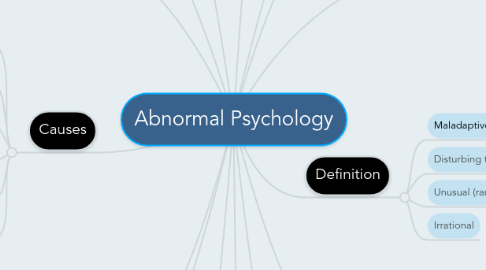
1. Depressive Disorders
1.1. Experiences extreme or inappropriate emotions
1.1.1. Major depressive disorder: most common mood disorder. More than two weeks.
1.1.2. Seasonal affective disorder (SAD): depression experienced only during certain times of the year, usually where there is less sunlight
1.1.3. Bipolar Disorder: Involves both depressed and manic episodes
2. Schizophrenic Disorders
2.1. Disordered, distorted thinking often demonstrated through delusions, hallucinations, disorganized language, and/or unusual affect and motor behavior
2.1.1. Delusions: Beliefs that have no basis in reality
2.1.2. Hallucinations: Perceptions in the absence of any sensory stimulation
2.1.3. Neologisms: Making up their own words
2.1.4. Inappropriate Effect: Reacting in inappropriate ways to events
2.1.5. Flat Effect: Having no emotional response
2.1.6. Clang Associations: Stringing together nonsense words that rhyme
2.1.7. Catatonia: a motor problem (wavy flexibility)
3. Personality Disorders
3.1. Well-established, maladaptive ways of behaving that negatively affect people's ability to function
3.1.1. Antisocial Personality Disorder: have little regard for other people's feelings
3.1.2. Dependent Personality Disorder: rely too much on the attention and help of others
3.1.3. Paranoid Personality Disorder: feel persecuted
3.1.4. Narcissistic Personality Disorder: seeing oneself as the center of the universe
3.1.5. Histrionic Personality Disorder: connotes overly dramatic behavior
4. Causes
4.1. Psychoanalytical
4.1.1. Internal, unconscious conflicts
4.2. Humanistic
4.2.1. Failure to strive toward one's potential or being out of touch with one's feelings
4.3. Behavioral
4.3.1. Reinforcement history, the environment
4.4. Cognitive
4.4.1. Irrational, dysfunctional thoughts or ways of thinking
4.5. Sociocultural
4.5.1. Dysfunctional society
4.6. Biomedical
4.6.1. Organic problems, biochemical imbalances, genetic predispositions
5. Trauma and Stressor-Related Disorders
5.1. Post-traumatic Stress Disorder (PTSD): involves flashbacks or nightmares following a person's involvement in or observation of a very troubling event
6. Paraphilias
6.1. Pedophilia: attraction to children
6.2. Zoophilia: attraction to animals
6.3. Fetishism: attraction to objects
7. Substance-related and Addictive Disorders
7.1. When the use of such substances or behaviors like gambling regularly negatively affects a person's life
8. Anxiety Disorders
8.1. Share a common symptom of anxiety
8.1.1. Phobias
8.1.1.1. Intense unwarranted fear of a situation or object
8.1.1.1.1. Claustrophobia: fear of enclosed spaces
8.1.1.1.2. Arachnophobia: fear of spiders
8.1.1.1.3. Agoraphobia: fear of open, public spaces
8.1.2. General Anxiety Disorder (GAD)
8.1.2.1. Experiences constant, low-level anxiety
8.1.3. Panic Disorder
8.1.3.1. Acute episodes of intense anxiety without any apparent provocation
8.1.3.2. Panic attack: additional anxiety due to anticipating the attacks
9. Somatic Symptom and Related Disorders
9.1. When a person manifests a psychological problem through a physiological symptom
9.1.1. Conversion Disorder: report the existence of a severe physical problem such as paralysis or blindness, and they will, in face, be unable to move their arms or see
10. Dissociative Disorders
10.1. Disruption in Consciousness
10.1.1. Dissociative Identity Disorder (DID): a person who has multiple personalities
10.1.2. Psychogenic Amnesia: Trauma so repressed, it breaks off into different consciouses
